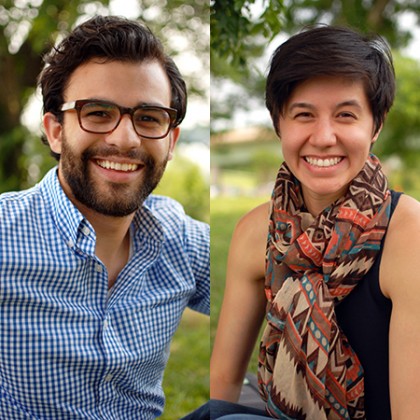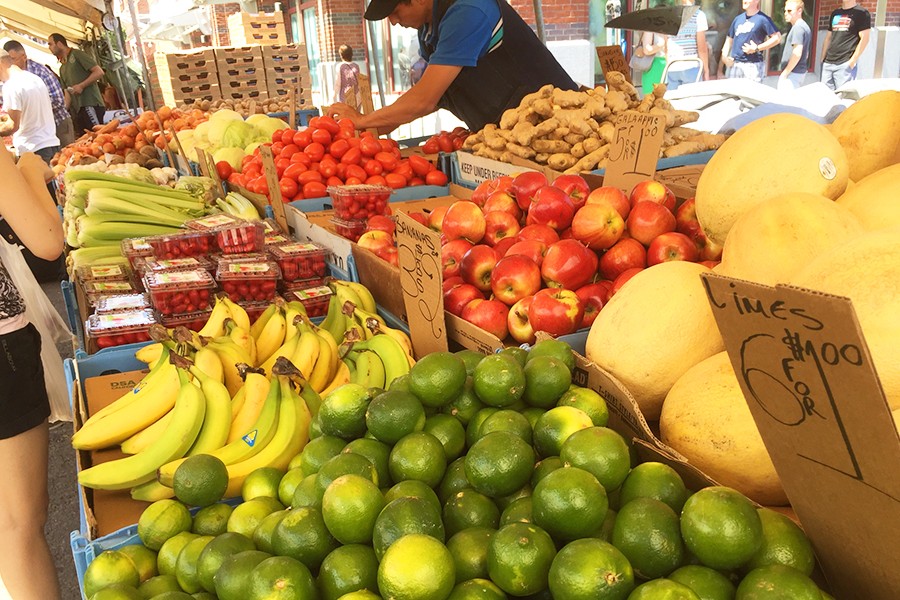When he lived in Boston a few years ago, Corbin Cunningham made a habit of frequenting Haymarket, the historic open-air market where he could consistently find cheap, ripe produce—like a huge box of tomatoes for $5.

Image caption: Corbin Cunningham and Marie Spiker
Vendors at the popular weekend market are able to sell surplus fruits and vegetables directly from the region's wholesale distributor, offering prices up to 90 percent lower than normal retail.
When Cunningham and his wife, Marie Spiker, moved to Baltimore to pursue doctorates at Johns Hopkins University, "we were wishing we had something like that here," he says. The couple simultaneously recognized Baltimore's need to increase fresh produce offerings in a large number of neighborhoods that are considered "food deserts."
Spiker and Cunningham found the opportunity to pursue their ideas through the Abell Foundation's Award in Urban Policy, which allows Baltimore-area college and grad students to compete with innovative policy solutions for the city. The Abell Foundation recently announced Spiker and Cunningham as this year's winners for their proposal for a vendors market in Baltimore selling discounted produce that would otherwise go to waste.
In developing their concept, Cunningham and Spiker looked at excess produce from the Maryland Food Center Authority, a centralized wholesale food distributor in Jessup that supplies fruits and vegetables to states throughout the Mid-Atlantic.
During the course of their research, Spiker and Cunningham found that more than 5,000 tons of the center's food waste will end up in landfills this year, and that some portion of that is edible food. Though the figure is impossible to calculate precisely, they have determined that somewhere between 110,000 and 1.3 million pounds could be fit for consumption. Instead of going to landfills, why shouldn't that food be offered to Baltimore residents, their policy paper reasons.
"We thought, this makes so much sense," Spiker says. "No one wants to throw anything away. It's a unique opportunity to not only reduce waste but also generate job opportunities."
While a regular farmers market caters in seasonal, locally sourced foods, a vendors market would focus on the produce shipped to the Maryland Food Center Authority from farms across the country. Some of that food—both Grade No. 1 quality produce and lesser grades—goes unsold to retailers and restaurants. The point of the vendors market would be to sell off the surplus that's still fresh and edible—usually it's already ripe, or just about to be.?
"The produce has to be high enough quality that people want it, and the prices are cheap," Spiker says.
Though the researchers present Haymarket as a model to follow, they acknowledge that its 185-year-old tradition can't simply be transplanted to Baltimore, a city with different needs and demographics than Boston. "You'd have to maintain the spirit of it," while making adjustments, Spiker says.
The couple envisions a local nonprofit or agency taking over the concept. Their paper identifies five potential partners, with two standing out as the best fit: the Baltimore Food Hub, an entrepreneurial food production campus planned for East Baltimore; or the Baltimore Public Markets Corporation, which oversees five public markets in the city and also partners with the Lexington Market.
With their paper now published, "it's out in the world for someone to run with it," says Spiker. As full-time PhD students—Spiker's studying nutrition at JHU's Bloomberg School of Public Health, Cunningham's studying visual attention and perception in the Department of Psychological and Brain Sciences at JHU's Krieger School of Arts and Sciences—they won't be taking a direct advocacy role with their concept, but can serve as consultants for those who do. Their paper also includes a number of policy suggestions for Baltimore City to facilitate the market, such as reducing regulatory ?hurdles and composting any remaining food waste.
"We've had a number of people contact us and say, 'We're interested in this idea,'" Cunningham says. "For us … we can talk about it, we know a lot about it. We're interested in pursuing it."
The Abell Foundation, which helped the researchers refine their final paper, describes their winning proposal as "a creative and compelling solution to [the] twin challenges" of food waste and food access in Baltimore. The award comes with a $5,000 prize.
The local foundation is currently accepting submissions for the 2016 Urban Policy Award through Oct. 16.
Posted in Health, University News, Student Life, Community
Tagged community, nutrition, baltimore, food deserts









